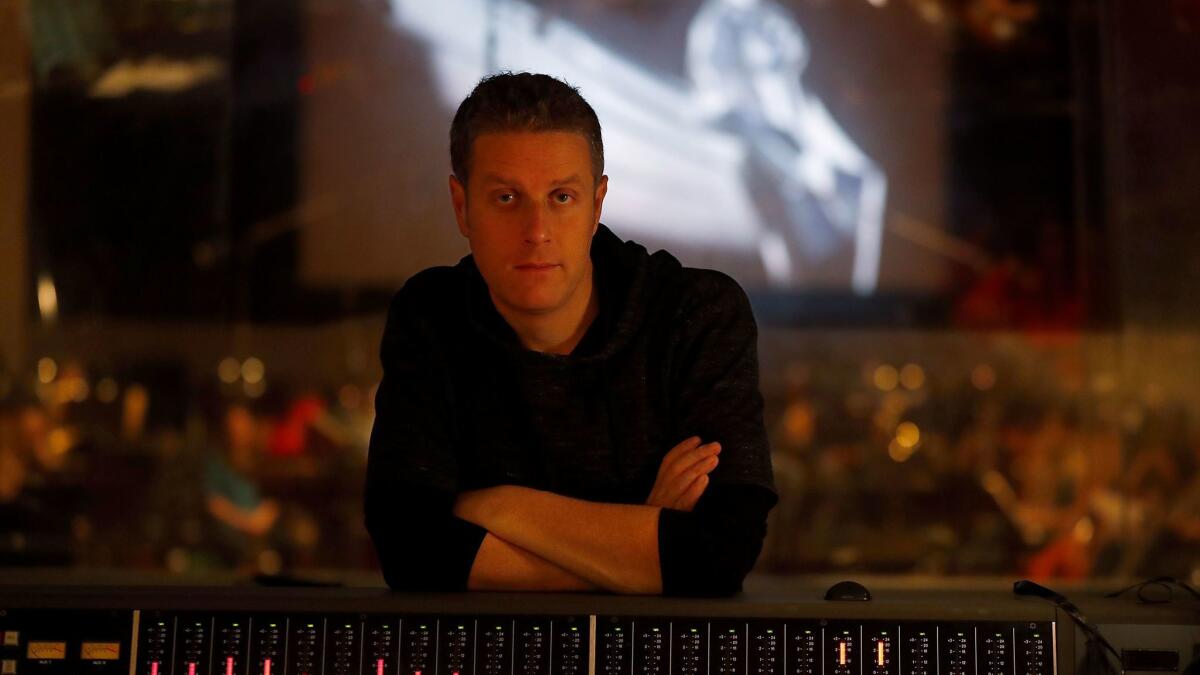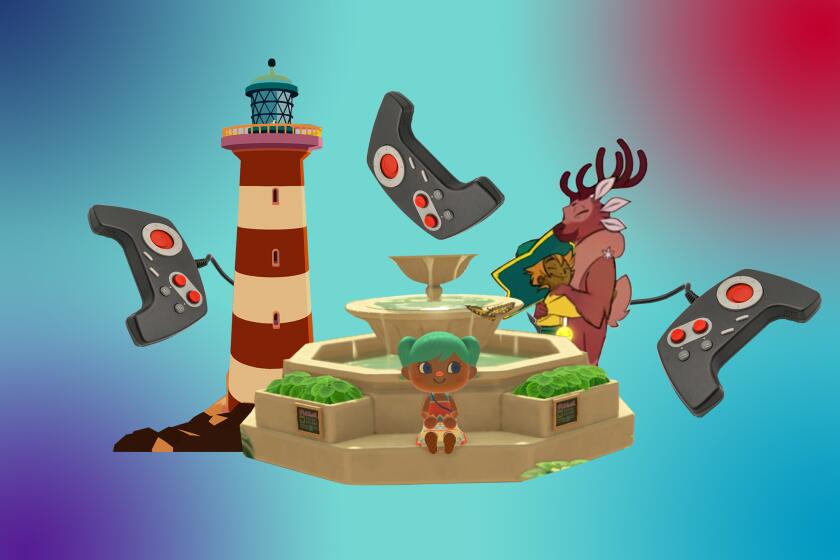Getting Keanu Reeves for the Game Awards was easy, compared to all the COVID-19 precautions

- Share via
A few months back, Game Awards founder Geoff Keighley starting doing Zoom meet-ups with fans, putting out a call for those who wanted to join on Twitter. A stated motive was to stay in touch with fans of the awards show, which will stream live Thursday from a Hollywood soundstage as well as numerous locations around the globe.
Now, Keighley has a confession to make.
Sure, he wanted to hear what aspects of the Game Awards fans connected with — last year, the online show boasted that it had 45 million livestreams — but that wasn’t what ultimately motivated him to spend his Sunday afternoons on a video conferencing app with strangers.
“I think it was me just being selfish,” Keighley says Sunday evening, admitting that he wanted some free feedback and validation that what he was doing mattered.
But more than that, he wanted company.
“I mean, part of it was probably just being a little lonely,” he says, noting that 2020, with its lack of in-person game events, many of which Keighley participates in, created what so many of us have been feeling: a social void.
Keighley was in a reflective mood. He’s certainly excited for the show. As has been well documented, video games have not only thrived during the COVID-19 pandemic but they have also helped connect so many of us, as simple games such as “Animal Crossing: New Horizons,” “Fall Guys” and “Among Us,” as well as many others, have become media sensations. “Animal Crossing” is among the nominees for game of the year, competing against “The Last of Us Part II,” “Hades,” “Ghost of Tsushima,” “Final Fantasy VII Remake” and “Doom Eternal.”
No game mattered as much to 2020 as “Animal Crossing: New Horizons.” But it’s not the only game that made an impact while COVID-19 kept us shut in.
But there’s also an underlying pall that can’t quite be avoided.
“I open the L.A. Times hourly,” Keighley says, noting that he can’t stop himself from constantly looking at the rising COVID-19 infection numbers.
When he committed last spring to staging a live awards show in 2020, there was the hope that come December, the virus would be at least a little bit under control.
That’s far from the case. Instead, Southern California is experiencing one of its fastest-growing and most dangerous surges of the pandemic.
“There’s certainly a version of the show we can do that would just be me sitting at home like I have been all summer,” Keighley says. “That’s one of the contingencies that we have, that we’ll have a satellite truck parked outside my house and I’ll do the show from here. This week, if things get particularly bad, we can pivot. We have three or four binders of other plans that we may have to pivot to and execute, given everything that’s going on. It’s stressful.”
Right now, the plans are for it to be just Keighley and a skeleton crew on the set of the awards show.
Also weighing on Keighley: the tone of the show. As much as he wants to celebrate the medium, he doesn’t want to appear tone-deaf amid a pandemic. Keighley notes that the online gaming fanbase, which is often extremely vocal and not always well behaved, can fool one into thinking everything is A-OK, despite even when it’s not.
“I feel like the general fans, they don’t really realize that new consoles shipped, and all these games are coming out, and it’s insane that this is normal,” says Keighley. While films have been delayed or shifted to streaming services, the game industry has experienced minimal visible pandemic-related derailments. “Here’s ‘Cypberunk.’ Here’s Xbox. Here’s PlayStation. So yeah, the audience on Twitter acts like nothing is different.”
Ex ‘Westworld’ writer Halley Gross joins Neil Druckmann to create the unexpectedly timely story in “The Last of Us Part II” set in a virus-ravaged world
For now, however, it’s all systems go, and the Game Awards aren’t holding back too much. Presenters, all remote, include “Tenet” director Christopher Nolan and “Cyberpunk 2077” star Keanu Reeves. In Seattle, Pearl Jam’s Eddie Vedder, whose song “Future Days” is heard throughout “The Last of Us Part II,” will perform. In London, composer Lorne Balfe will conduct the London Philharmonic Orchestra from Abbey Road Studios.
Keighley, a lifelong fan of the Muppets, will also bring them back after Bunsen Honeydew and Beaker were the highlight of last year’s show. And as always, Keighley has lined up more than a dozen looks at upcoming games. The Game Awards, after all, are part celebration of the year that was and part a look ahead. The festivities begin at 3:30 p.m. Pacific time.
“I think gaming’s best days are ahead,” says Keighley. “This year was awesome, but wait till you see what’s coming in 2022 or 2023. I want to capture people’s imagination. That forward momentum is what motivates me to devote my life to building these things. I get infectiously excited when I see this stuff.”
But back to awards show logistics. Keighley notes that 2020’s edition, despite being essentially remote, has been the most expensive ever to produce. In 2014, Keighley invested $1 million of his own cash into getting the gala up and running, but budgets have skyrocketed, especially this year, in part because of COVID-19 tests for him and his crew and in part because of the costs related to remote camera set-ups around the world with all the nominees.
Keighley, who closely watched this year’s Emmys, said he wants the Game Awards to have a sense of spontaneity. No winners will be notified ahead of time (they’re largely voted on by the global gaming media, of which I am a part. But after this year’s Emmys, which Times television critic Lorraine Ali praised as one of the weirdest but also the most entertaining, Keighley thinks award shows may be forever changed for the better.
“I thought the Emmys, when I looked at that, this was better than the regular Emmys,” says Keighley. “Sometimes being forced to do things differently can create opportunities. We still wanted to be somewhat ambitious, rather than just doing prerecorded videos. All of us who work on the show, and the game publishers who support us, felt this was an important and banner year for gaming. Gaming, despite everything, has been able to comfort and entertain people. I’m crossing everything I have that we’ll be OK to still do it on Thursday.”
It’s no accident that “Animal Crossing: New Horizons” is resonating now. Built to ward off loneliness in 2001, the franchise is made for the pandemic moment.
Additionally, the ability to be remote has upped the level of talent Keighley has had access to. In previous years, participants flew to L.A. on their own dime to appear at the Microsoft Theater downtown. This year, the show is paying to send broadcast equipment around the world, but that also allows more developers to partake in the proceedings. And it’s also, Keighley believes, better television, even though the Game Awards are streamed online across numerous social media networks and game sites.
“These virtual awards are maybe the way it should be done in the future,” Keighley says. “With the Emmys, it was cool to see people at home. They felt more relatable and approachable.”
It’s important to note that Keighley, a former journalist, truly does love the spectacle of award shows. Despite games being at the forefront of entertainment and technology, he never considered experimenting too heavily with the format this year. So no, he didn’t consider a virtual reality broadcast, nor did he entertain the idea of staging a show in an online world such as “Fortnite” or “Minecraft.”
But that also gets to Keighley’s prime motivation for the show: to expand the audience of players by showing the world that games can be accessible.
“I’ve always said that I do the Game Awards as not a video game award show,” says Keighley. “It’s an award show for entertainment that just happens to be about video games. That’s how we grow this industry, having other audiences come in and hopefully watch it and say, ‘That seems kind of interesting.’”
More to Read
The biggest entertainment stories
Get our big stories about Hollywood, film, television, music, arts, culture and more right in your inbox as soon as they publish.
You may occasionally receive promotional content from the Los Angeles Times.












